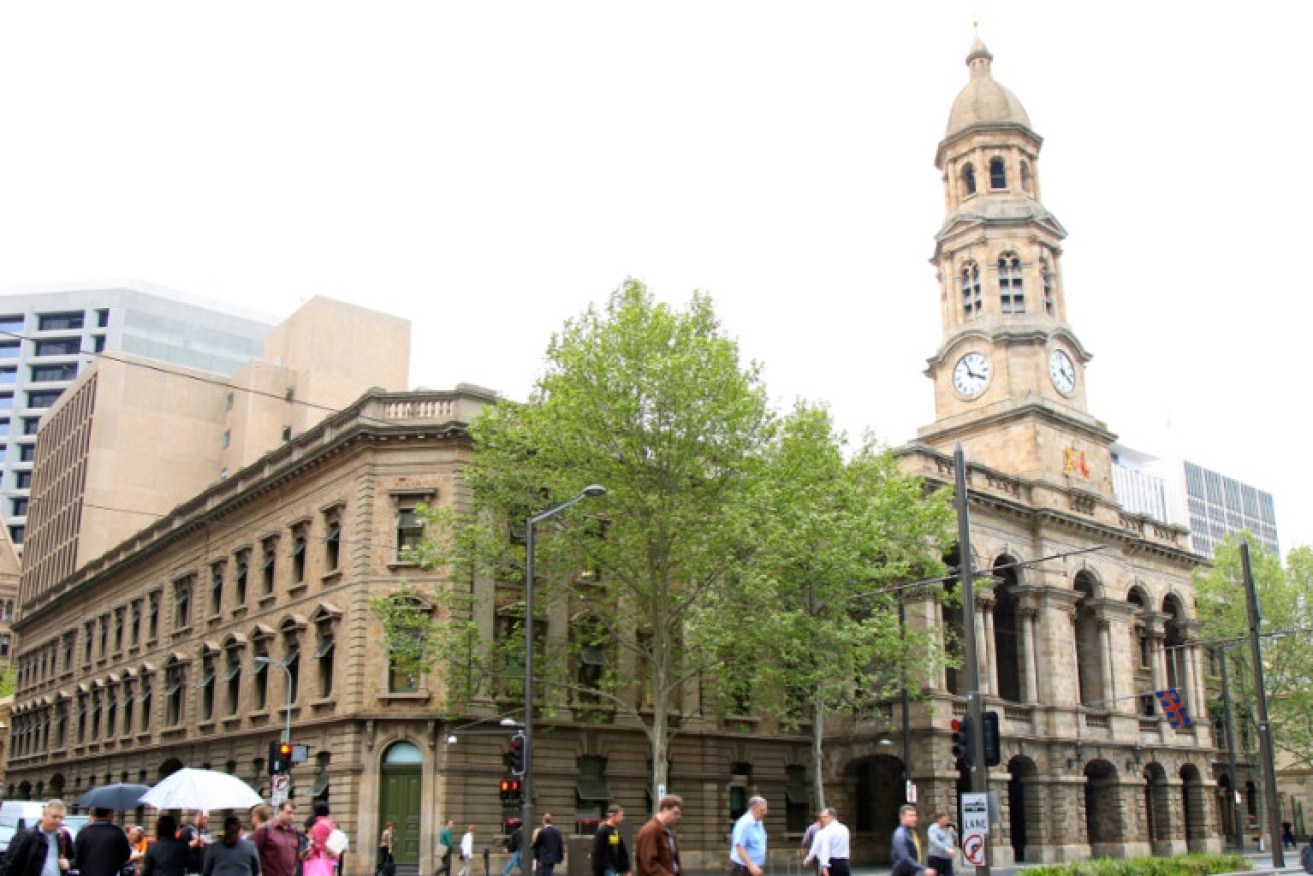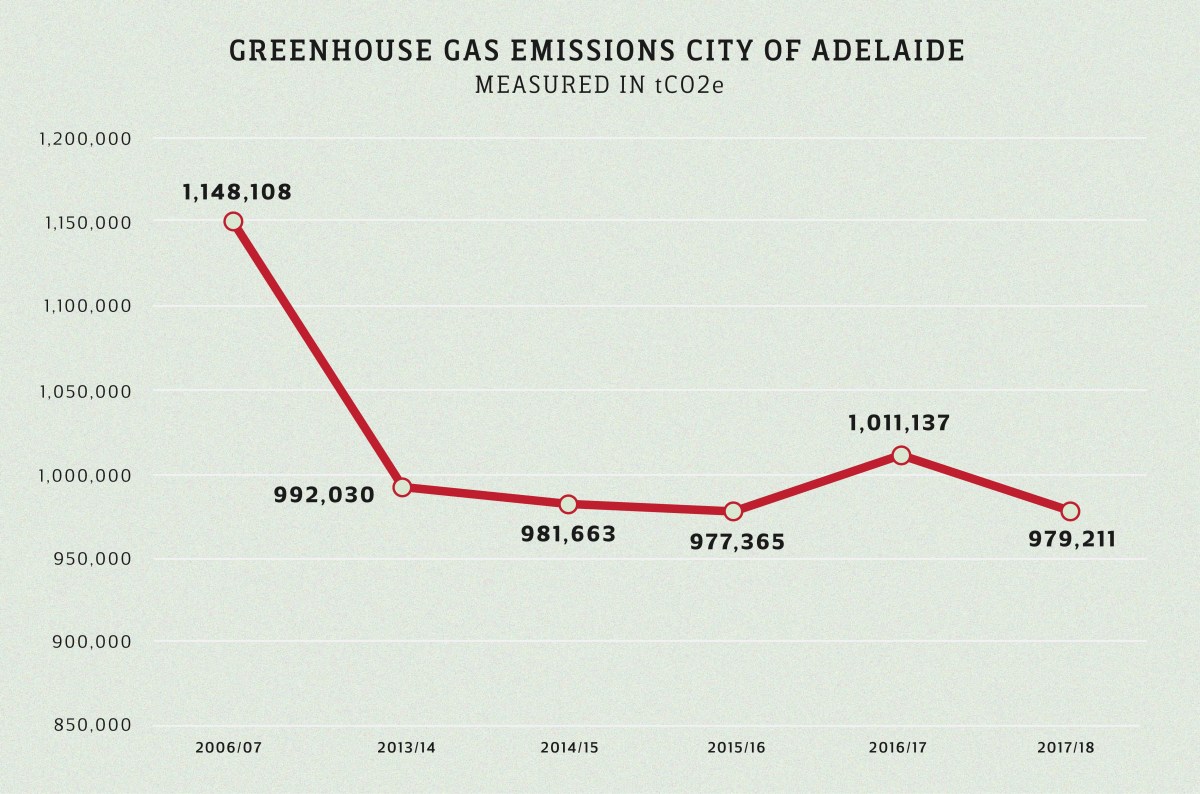City council gives up carbon neutral leadership goal
The Adelaide City Council is set to abandon its goal to become a world leader on carbon neutrality amid competition with interstate and overseas cities and rising transport emissions.

Photo: Nat Rogers/InDaily
InDaily reported in 2017 that the city council had dropped its lofty ambition to make Adelaide “the world’s first carbon neutral city”, despite repeated public pledges and a signed agreement with the State Government.
The council instead set its sights on making Adelaide “one of the world’s first carbon neutral cities by 2025” (emphasis added).
Now, the council is proposing to drop its target of world leadership altogether, with its draft 2020-2024 strategic plan stating Adelaide will become “a carbon neutral city, where sustainability is core”.
InDaily asked the council to confirm that it is no longer striving to make Adelaide “one of the world’s first carbon neutral cities”.
The council’s sustainability associate director Michelle English refrained from mentioning the diminished target, instead stating that the draft strategic plan was yet to pass the chamber.
“The draft identifies environmental leadership as one of four strategic outcomes which council members have indicated they wish to achieve with the community during the next four years,” she said.
“Underpinning this outcome is a proposed commitment to become ‘a carbon neutral city, where sustainability is core’.
“This is consistent with our existing ambition for the city to become carbon neutral.”
Carbon neutrality, or having a net-zero carbon footprint, is achieved when the amount of greenhouse gas emissions emitted into the atmosphere is balanced by the amount being removed.
In 2015, the council signed an agreement with the Weatherill Government to make Adelaide the “world’s first carbon neutral city by 2025”.
A Carbon Neutral Adelaide Foundation report presented to the State Government in 2015 stated: “On current information, ‘world’s first’ means ‘before 2020’.”
Adelaide was, at the time, among several cities vying to become the first to achieve carbon neutrality.
In 2013, Melbourne mounted a long-term campaign to become carbon neutral by this year – a goal it is yet to reach despite the city reducing its emissions by 54 per cent between 2011-12 and 2018-19.
Copenhagen in Denmark is working towards a 2025 deadline – a target it says it is on track to achieve after reducing its carbon emissions by 42 per cent since 2005.
According to Adelaide’s latest carbon neutral status update published in July last year, carbon emissions in the Adelaide City Council area reduced by 15 per cent from the 2007 to 2018 financial years.
There was a dramatic reduction in emissions between 2014 and 2015, a less significant reduction between 2015 and 2016 and a slight increase in emissions between 2016 and 2017.
Between 2017 and 2018 emissions dropped again, but the level was still above what was recorded in 2016.
The overall reduction in emissions was driven by a 35 per cent decline in energy emissions – boosted by the rapid growth in renewable electricity.
Over the same time, transport emissions increased by 27 per cent and waste emissions increased by six per cent.
The city’s gross regional product also increased by 33 per cent, which the council said demonstrates a decoupling of greenhouse gas from economic growth.

The CBD and North Adelaide’s carbon emissions have been falling, but the pace of reductions has slowed over time. Data: ACC. Image: Nicky Capurso / InDaily.
The July update shows only 18 of the 104 actions identified to achieve carbon neutrality in the city were completed.
Eighteen actions were listed as “ongoing/annual”, 59 were “in progress” and nine were “not started”.
Lord Mayor Sandy Verschoor told InDaily the council and State Government were still committed to achieving carbon neutrality in Adelaide by 2025.
“Our biggest challenge is rising transport emissions and to tackle this we need policies, particularly at the federal level, which will help transition to low emissions and zero emission vehicles,” she said.
“There is an action plan in place and Council’s been working for many years to make its operations carbon neutral and this will be achieved this year as planned.
“This also follows the recent signing of a deal to source all our electricity needs from renewable sources.”
Whatever means the council adopts to achieve carbon neutrality, the outcome is likely to be expensive and time-consuming.
Bright New World environment consultancy firm founder Ben Heard said carbon neutrality was “very fashionable in the 2000s to 2010” but “it’s very, very difficult to achieve, particularly for a municipal council within the functional, economic and energy-boundary of the city” as the underlying economy had not become dramatically cleaner.
“Unless… the country around you has cleaned up its electricity such that you can use as much electricity as you like with no emissions attached to it, that makes it relatively easy, but that isn’t the case in Australia,” he said.
“Councils and cities don’t have the power and resources to make it – they’re customers of the grid like everybody else is – so there’s only so far you can get with solar systems on certain buildings.
“Unfortunately, carbon neutral is adopted as an ethos and as a target and then as the work is done to understand what it means and what the implications are in terms of policy and cost, it quietly gets pushed further and further into the future and… the certainty in statements or the urgency in the delivery comes off a little bit.”
Heard said carbon neutrality was a “very, very, very long way away” for cities in Australia “and wouldn’t be pushing the systemic change we need in improving environment outcomes on our own soil”.
He said Copenhagen needed to take a “shorter step” because it already had a greener power supply and its residents were less dependent on cars.
“I think it would be quite a legitimate thing for Adelaide to do more of – to transition the nature of the city to make it more amenable to people using bicycles, walking, or using public transport.
“The more effort that gets put into those systems, the more feasible carbon neutrality may be down the track.”
Want to comment?
Send us an email, making it clear which story you’re commenting on and including your full name (required for publication) and phone number (only for verification purposes). Please put “Reader views” in the subject.
We’ll publish the best comments in a regular “Reader Views” post. Your comments can be brief, or we can accept up to 350 words, or thereabouts.




